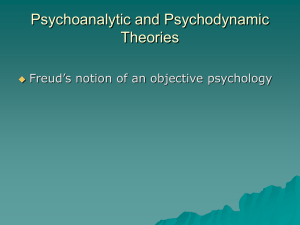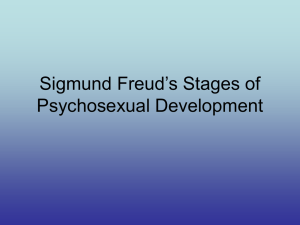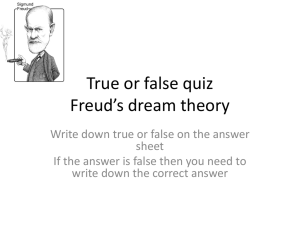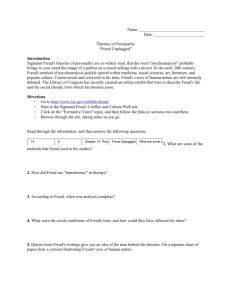letters/5 - University of Warwick
advertisement
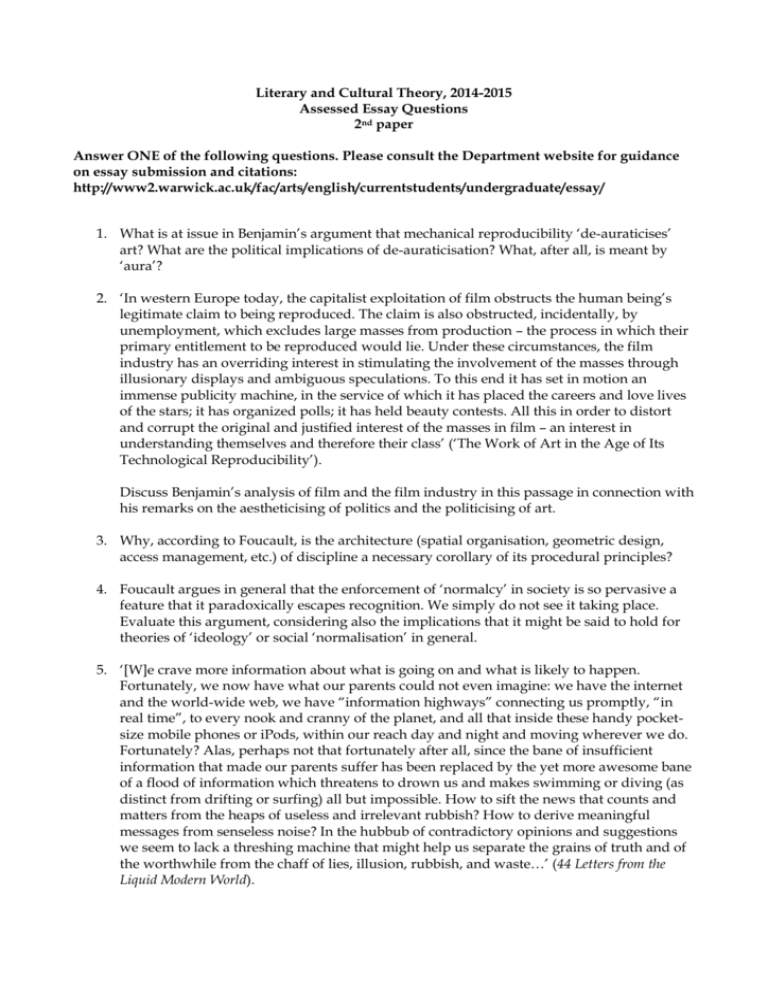
Literary and Cultural Theory, 2014-2015 Assessed Essay Questions 2nd paper Answer ONE of the following questions. Please consult the Department website for guidance on essay submission and citations: http://www2.warwick.ac.uk/fac/arts/english/currentstudents/undergraduate/essay/ 1. What is at issue in Benjamin’s argument that mechanical reproducibility ‘de-auraticises’ art? What are the political implications of de-auraticisation? What, after all, is meant by ‘aura’? 2. ‘In western Europe today, the capitalist exploitation of film obstructs the human being’s legitimate claim to being reproduced. The claim is also obstructed, incidentally, by unemployment, which excludes large masses from production – the process in which their primary entitlement to be reproduced would lie. Under these circumstances, the film industry has an overriding interest in stimulating the involvement of the masses through illusionary displays and ambiguous speculations. To this end it has set in motion an immense publicity machine, in the service of which it has placed the careers and love lives of the stars; it has organized polls; it has held beauty contests. All this in order to distort and corrupt the original and justified interest of the masses in film – an interest in understanding themselves and therefore their class’ (‘The Work of Art in the Age of Its Technological Reproducibility’). Discuss Benjamin’s analysis of film and the film industry in this passage in connection with his remarks on the aestheticising of politics and the politicising of art. 3. Why, according to Foucault, is the architecture (spatial organisation, geometric design, access management, etc.) of discipline a necessary corollary of its procedural principles? 4. Foucault argues in general that the enforcement of ‘normalcy’ in society is so pervasive a feature that it paradoxically escapes recognition. We simply do not see it taking place. Evaluate this argument, considering also the implications that it might be said to hold for theories of ‘ideology’ or social ‘normalisation’ in general. 5. ‘[W]e crave more information about what is going on and what is likely to happen. Fortunately, we now have what our parents could not even imagine: we have the internet and the world-wide web, we have “information highways” connecting us promptly, “in real time”, to every nook and cranny of the planet, and all that inside these handy pocketsize mobile phones or iPods, within our reach day and night and moving wherever we do. Fortunately? Alas, perhaps not that fortunately after all, since the bane of insufficient information that made our parents suffer has been replaced by the yet more awesome bane of a flood of information which threatens to drown us and makes swimming or diving (as distinct from drifting or surfing) all but impossible. How to sift the news that counts and matters from the heaps of useless and irrelevant rubbish? How to derive meaningful messages from senseless noise? In the hubbub of contradictory opinions and suggestions we seem to lack a threshing machine that might help us separate the grains of truth and of the worthwhile from the chaff of lies, illusion, rubbish, and waste…’ (44 Letters from the Liquid Modern World). Bauman’s suggestion here is that in the progressive unfolding of ‘liquid modernity’, we are losing in depth what we gain in breadth – and that the net outcome of this ‘exchange’ is humanly impoverishing. Do you agree? Refer to Bauman and at least one other theorist you have read this year in formulating your answer. 6. ‘If there ever was, as Jürgen Habermas insists, a “project of modernity,” it was an intention to replace collective and individual human heteronomy with collective and individual autonomy (autonomy of the human species towards hazards and contingencies of nature and history, and autonomy of human persons toward manmade pressures and constraints). That double-pronged autonomy was hoped and anticipated to produce and ensure a similarly two-level freedom of self-assertion, simultaneously species-wide and individual. The two front lines in the war for autonomy were meant to be closely interdependent. The autonomy of humanity was to secure and protect the autonomy of the individuals, while the individuals, once they became truly autonomous and free to deploy their powers of reason, would see to it that humanity jealously guarded its newly acquired autonomy and exploited it to promote and safeguard autonomy of the individuals. If ever there was a project of Enlightenment, it was wrapped around the idea of emancipation’ (Bauman, Does Ethics Have a Chance in a World of Consumers?). Discuss, with reference to at least three of the theorists you have read this year. 7. ‘Integration is disintegration’, the reduction of heterogeneity to sameness; this is Adorno’s version of reification. With this conception in mind, analyse the relative strengths and weaknesses of Adorno’s comments on modern culture. 8. ‘Light art has been the shadow of autonomous art. It is the social bad conscience of serious art. The truth which the latter necessarily lacked because of its social premises gives the other the semblance of legitimacy. The division itself is the truth: it does at least express the negativity of the culture which the different spheres constitute’ (‘The Culture Industry: Enlightenment as Mass Deception’). Unpack this formulation, and explore some of its implications for Adorno’s (and Horkheimer’s) understanding of modern culture. 9. ‘[M]en are not gentle creatures who want to be loved, and who at the most can defend themselves if they are attacked; they are, on the contrary, creatures among whose instinctual endowments is to be reckoned a powerful share of aggressiveness. As a result, their neighbour is for them not only a potential helper or sexual object, but also someone who tempts them to satisfy their aggressiveness on him, to exploit his capacity to work without compensation, to use him sexually without his consent, to seize his possessions, to humiliate him, to cause him pain, to torture and to kill him. Homo homini lupus [“man is a wolf to man”]… In consequence of this primary mutual hostility of human beings, civilized society is perpetually threatened with disintegration. The interest of work in common would not hold it together; instinctual passions are stronger than reasonable interests. Civilization has to use its utmost efforts in order to set limits to man’s aggressive instincts and to hold the manifestations of them in check by psychical reaction-formations. Hence, therefore, the use of methods intended to incite people into identifications and aiminhibited relationships of love, hence the restriction upon sexual life, and hence too the ideal commandment to love one’s neighbour as oneself – a commandment which is really justified by the fact that nothing else runs so strongly counter to the original nature of man’ (Civilization and Its Discontents). Discuss this summary statement from Freud, drawing out its structuring assumptions and implications. Do you agree with Freud here, or disagree with him? 10. The theory of alienation demonstrated the fact that man does not realize himself in his labor, that his life has become an instrument of labor, that his work and its products have assumed a form and power independent of him as an individual. But the liberation from this state seems to require, not the arrest of alienation, but its consummation, not the reactivation of the repressed and productive personality but its abolition. The elimination of human potentialities from the world of (alienated) labor creates the preconditions for the elimination of labor from the world of human potentialities’ (Eros and Civilization). Discuss the meaning and implications of this passage, paying particular attention to the utopian dimensions of Marcuse’s thinking. 11. ‘The notion that a non-repressive civilization is impossible is a cornerstone of Freudian theory. However, his theory contains elements that break through this rationalization; they shatter the predominant tradition of Western thought and even suggest its reversal. His work is characterized by an uncompromising insistence on showing up the repressive content of the highest values and achievements of culture… Freud questions culture not from a romanticist or utopian point of view, but on the ground of the suffering and misery which its implementation involves. Cultural freedom thus appears in the light of unfreedom, and cultural progress in the light of constraint. Culture is not thereby refuted: unfreedom and constraint are the price that must be paid. But as Freud exposes their scope and their depth, he upholds the tabooed aspirations of humanity: the claim for a state where freedom and necessity coincide’ (Eros and Civilisation). Discuss and evaluate the terms of Marcuse’s admiring critique of Freud. What in Freud does he find so remarkable and radical? Where does he differ from Freud, and on what basis? 12. Irigaray’s work sometimes posits ‘woman’ as a constructed category, at other times plays with essentialism and the writing of woman as directly anatomical and natural. What is at stake here and where do you think she ultimately stands? 13. Write an essay on the significance of the categories of ‘mimesis’ and ‘mimicry’ in the work you have read by Luce Irigaray. 14. ‘“Are you a woman?’ A typical question. A man’s question? I don’t think that a woman – unless she has been assimilated to masculine, and more specifically phallic, models – would ask me that question. Because “I” am not “I,” I am not, I am not one. As for woman, try and find out…’ (Irigaray, ‘Questions’) Discuss. 15. If there isn’t a human nature, how can we make sense of the concept of ‘identity’? Answer with reference to any three theorists you have read this year. 16. ‘But, himself a prisoner of a certain economy of the logos, [Freud] defines sexual difference by giving a priori value to Sameness, shoring up his demonstration by falling back upon time-honored devices such as analogy, comparison, symmetry, dichotomous oppositions, and so on. Heir to an “ideology” that he does not call into question, Freud asserts that the “masculine” is the sexual model, that no representation of desire can fail to take it as the standard, can fail to submit to it. In so doing, Freud makes manifest the presuppositions of the scene of representation: the sexual indifference that subtends it assures its coherence and its closure. Indirectly, then, he suggests how it might be analyzed. But he never carries out the potential articulation between the organization of the unconscious and the difference between the sexes’ (Irigaray, ‘The Power of Discourse’). Discuss the claims Irigaray makes in this passage, unpacking the terms of her critique of Freud and exploring what she means by the ‘sexual indifference’ that subtends the ‘scene of representation’. 17. Several of the theorists we have read in this module foreground personal experience in different ways as a category or dimension of critical practice. Referring to at least two such theorists, discuss how the personal is an important category of analysis in their work, a place or reference, or point of departure for their arguments. What is useful about the resort to the personal? What are the limitations or pitfalls of this move? 18. Discuss the latent tensions and affinities between ‘feminist’ and ‘green’ politics as Kate Soper discusses them in her chapter, ‘Nature and Sexual Politics’. 19. ‘At night I gather up my body, I step behind the wheel, I slip between my curtains, I circulate between two bloodstreams, according to what day of night it is I soar up, I descend, cities emerge from me, I travel through them, I leave them behind, all my outings on high. Am I dreaming? No. These are my lives that come to me, all the ones that lead me everywhere, into the regions, lands, countrysides, cities, cultures, nations, where my being has been touched, a single time suffices, to the quick, struck for life – to all the places from which a love letter or poison-pen letter has been mailed and then received so powerfully by my body that it could not respond. They have led me into almost all the single countries, the compound countries, the decomposed or reconstituted countries – to all the sites where History has fertilized my geography. I travel: where people suffer, where they fight, where they escape, where they enjoy, my body is suddenly there’. Worldwide my unconscious, worldwide my body. What happens outside happens inside. I myself am the earth, everything that happens, the lives that live me in my different forms, the voyage, the voyager, the body of travel and the spirit of travel, and all of this with such suppleness that I go in and out, in and out, I am in my body and my body is in me, I envelop myself and contain myself, we might be afraid of getting lost but it never happens, one of my lives always brings me back to solid body’ (Cixous, ‘Coming to Writing’). Discuss the ways in which writing is figured as a social (and imaginative) practice in Cixous’s essay. 20. Which of the two parts of Mike Davis’ essay, ‘Who Will Build the Ark?’ – the part entitled ‘Pessimism of the Intellect’ or the part entitled ‘Optimism of the Imagination’ – do you feel has the greater force? Explain your answer. 21. ‘For the moment, I retain the language of Nature/Society and “socio-ecological,” but emphasize from the outset that these terms represent the results of an underlying relation – what I call, following Theophrastus, the oikeios. This signifies the relation that produces manifold environments and organisms as irreducibly plural abstractions. To take the Nature/Society binary as a point of departure confuses the origins of a process with its results’. (Moore, ‘Ecology, Capital, and the Nature of Our Times’). Discuss the significance of Moore’s use of the concept of the oikeios and its implications for a theory of historical capitalism. 22. Moore distinguishes between ‘epochal ecological crises’ and ‘developmental ecological crises’. Analyse this distinction and discuss its implications for how we might understand the current ecological conjuncture. Feel free to refer to the work of other theorists you have read this year, in addition to Moore, in your answer. 23. Write an essay that explores contemporary debates on climate change, analysing these through the conceptual frameworks provided by any two of the following: Davis, Moore, Klein, and Parenti. 24. What is ‘slow violence’, as Rob Nixon talks about it in his book of that title, and why does he suggest that we need to develop a theory of this ‘different kind of violence’? 25. Discuss the use of the concept of ‘world-system’ in any of the recent writings on ‘world literature’ that you have read. 26. ‘Extractivism is a nonreciprocal, dominance-based relationship with the earth, one purely of taking. It is the opposite of stewardship, which involves taking but also taking care that regeneration and future life continue. Extractivism is the mentality of the mountaintop remover and the old-growth clear-cutter… These ideas predate industrial-scale extraction of fossil fuels. And yet the ability to harness the power of coal to power factories and ships is what, more than any single other factor, enabled these dangerous ideas to conquer the world. It’s a history worth exploring in more depth, because it goes a long way toward explaining how the climate crisis challenges not only capitalism but the underlying civilizational narratives about endless growth and progress within which we are all, in one way or another, still trapped’ (This Changes Everything, pp. 169-70). Critically analyse Klein’s account of the relationship between capitalism and climate in This Changes Everything, paying particular attention to her concept of ‘extractivism’. 27. ‘For the apocalyptician, the spectre of universal catastrophe may look like a good way of rallying a middle class who may not directly suffer from the impact of fossil-fuelled globalisation. But for many listeners, to flatten out existing social conflict in this way feels disempowering. If the threat of global collapse is supposed to spur us all toward concerted action, why does it seem instead to paralyse the political imagination, spook ordinary people into putting their rebellious instincts on ice, and deaden discussion among different social movements about the lessons of their struggles?’ (Larry Lohmann, ‘Fetishisms of Apocalypse’, p. 2). Discuss Lohmann’s critique of apocalypse narratives with reference to the presentation of climate change in any two or more of the theorists we have read this term.


